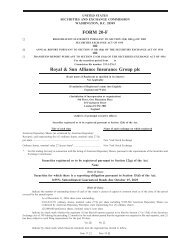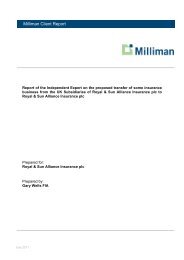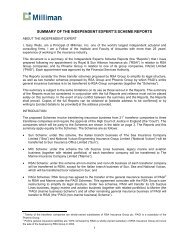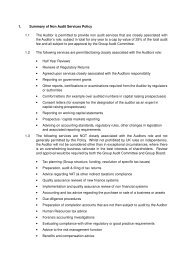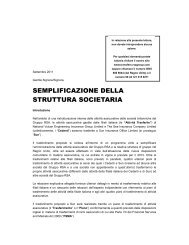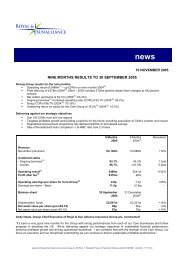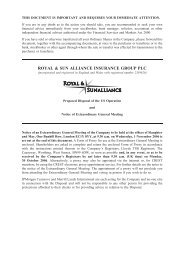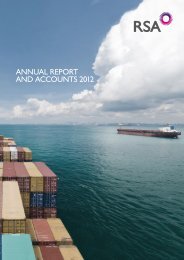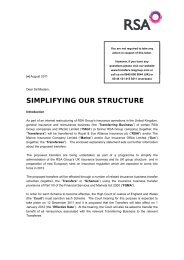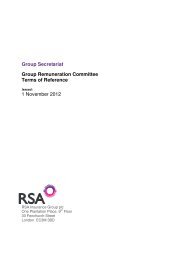RSA RETAIL RESEARCH PAPER2 WEB HR.pdf
RSA RETAIL RESEARCH PAPER2 WEB HR.pdf
RSA RETAIL RESEARCH PAPER2 WEB HR.pdf
You also want an ePaper? Increase the reach of your titles
YUMPU automatically turns print PDFs into web optimized ePapers that Google loves.
ECONOMIC CHALLENGES AND<br />
CONSUMER CONFIDENCE<br />
CONSUMERS HAVE HAD TO RETHINK THEIR FINANCES<br />
The economic stresses of this century, so far, have changed the<br />
world forever and have had a massive impact on consuming<br />
habits. Consumers have experienced a credit crunch, recession<br />
and practical collapse of the fi nancial system. The Euro has come<br />
under great pressure as a result and there may still be more<br />
economic turmoil across Europe. Some countries such as Greece<br />
and Spain are struggling to turnaround major defi cits. This has had<br />
a major impact on the day to day lives of the inhabitants of those<br />
countries. Consumers have seen rising bills, rising taxation, rising<br />
unemployment and reductions in public services.<br />
For many of the countries across Europe, Retail prices have either<br />
been reducing or going up only steadily. In the UK and Germany,<br />
prices have begun to go up on core products.<br />
For Retailers across Europe, there have been visible changes to<br />
sales volumes with, on the whole, steady declines.<br />
<strong>RETAIL</strong> SALES 2009 – 2010<br />
% Growth PA<br />
10%<br />
5%<br />
0%<br />
-5%<br />
-10%<br />
-15%<br />
-20%<br />
Russia<br />
Luxembourg<br />
Poland<br />
Sweden<br />
Turkey<br />
Austria<br />
France<br />
UK<br />
Switzerland<br />
Norway<br />
Finland<br />
Belgium<br />
Italy<br />
Eurozone<br />
Germany<br />
Portugal<br />
Czech Republic<br />
Denmark<br />
Netherlands<br />
Hungary<br />
Ireland<br />
Spain<br />
Slovenia<br />
Slovakia<br />
Bulgaria<br />
Romania<br />
Greece<br />
Estonia<br />
Lithuania<br />
Latvia<br />
Ref. Cushman & Wakefi eld, Oxford Economics<br />
According to the statistics, previous recessions have seen food<br />
category sales least affected; this time round this category has also<br />
seen an impact, showing how tough things have been<br />
for consumers.<br />
Consumers once trusted fi nancial institutions almost above all<br />
others. This trust has vanished and there is widespread distrust of<br />
fi nancial institutions in general. There is also now less willingness<br />
or ability to invest for the future. There are major concerns as we<br />
write this for further recession and for further impacts of defi cit<br />
in the Euro.<br />
POVERTY IS A GROWING ISSUE WORLDWIDE<br />
Nearly half of the world (48%) lives in poverty.<br />
Poverty is pronounced deprivation in well-being, and comprises<br />
many dimensions. It includes low incomes and the inability to<br />
acquire the basic goods and services necessary for survival<br />
with dignity. Poverty also encompasses low levels of health and<br />
education, poor access to clean water and sanitation, inadequate<br />
physical security, lack of voice, and insuffi cient capacity and<br />
opportunity to better one’s life.<br />
World Bank[5]<br />
The poorest countries are growing at the quickest rate. This makes<br />
a large shift away from poverty very diffi cult.<br />
POPULATION CLOCK 2011<br />
World<br />
More Developed<br />
Countries<br />
Less Developed<br />
Countries<br />
Population 6,986,951,000 1,241,580,000 5,745,371,000<br />
Births per Year 139,558,000 14,070,000 125,488,000<br />
Day 382,351 38,548 343,803<br />
Minute 266 27 239<br />
Deaths per Year 56,611,000 12,201,000 44,410,000<br />
Day 155,099 33,427 121,671<br />
Minute 108 23 84<br />
Natural increase<br />
Natural increase<br />
Year 82,947,000 1,869,000 81,078,000<br />
(births-deaths)per Day 227,252 5,121 222,132<br />
Minute 158 4 154<br />
Infant deaths per Year 6,078,000 77,000 6,001,000<br />
Day 16,652 211 16,441<br />
Minute 12 0.1 11<br />
Ref. Population reference bureau<br />
Some areas within Europe are also poor and getting poorer as the<br />
economic situation worsens.<br />
SPENDING POWER HAS BECOME MORE FEMALE<br />
Spending power for females has increased, although in many cases<br />
there is still a difference in earnings with male counterparts.<br />
Some examples within Europe:<br />
• In Switzerland 61% of females are economically active vs<br />
74% of males.<br />
• In comparison, in Iraq only 14% of females are economically<br />
active vs 19% of males.



